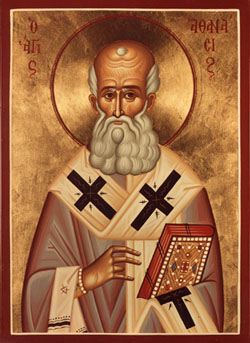“[Jesus] took human flesh from the ever-virgin Mary.” –Athanasius
 Athanasius is a theological stud. If it weren’t for the influence of Athanasius we’d all likely be Arians, and saying silly things like, “There once was a time when he was not”. We Protestants are big fans of Athanasius.
Athanasius is a theological stud. If it weren’t for the influence of Athanasius we’d all likely be Arians, and saying silly things like, “There once was a time when he was not”. We Protestants are big fans of Athanasius.
But it kind of freaks us out when he says things like this. Here we are, a mere 300 years after the ascension of Jesus, and church leaders like Athanasius are talking about the perpetual virginity of Mary. How could something like this develop in only 300 years?
If Athanasius can say things like this—and not be soundly rebuked, even though he is Athanasius—this should tell us that belief in the perpetual virginity of Mary wasn’t new with him. Should we then conclude, that this is something the apostles taught and believed? Could something get so “off” in only 300 years?
Church and State
In 1802 Thomas Jefferson, writing to Danbury Baptists said this:
Believing with you that religion is a matter which lies solely between Man & his God, that he owes account to none other for his faith or his worship, that the legitimate powers of government reach actions only, & not opinions, I contemplate with sovereign reverence that act of the whole American people which declared that their legislature should “make no law respecting an establishment of religion, or prohibiting the free exercise thereof”, thus building a wall of separation between Church & State.
One of the hallmarks of the New World was a freedom to exercise religion apart from any government interference. The separation of church and state meant that the government could not interfere with churches. It did not mean that the state must be wholly secular. The concern was to provide freedom of religion, not a freedom from religion.
Fast forward to 1992 and Justice Scalia would refer to this same statement and the Establishment Clause as a bulldozer:
In holding that the Establishment Clause prohibits invocations and benedictions at public school graduation ceremonies, the Court – with nary a mention that it is doing so – lays waste a tradition that is as old as public school graduation ceremonies themselves, and that is a component of an even more longstanding American tradition of nonsectarian prayer to God at public celebrations generally. As its instrument of destruction, the bulldozer of its social engineering, the Court invents a boundless, and boundlessly manipulable, test of psychological coercion…
Not even two hundred years and a phrase that was meant to protect religion from the government was turned to protect the government from any religious influence.
Conclusion
Hopefully, you see the point that I am making. In our very nation we’ve seen a complete turn of a phrase in only 200 years. It’s not too much, then, to think that 300 years removed from the early church that a doctrine like the perpetual virginity of Mary could gain traction. Just as in the case with the meaning of church and state being turned, so also the status of Mary within the Roman Catholic Church took time. Just because it’s early doesn’t mean it’s biblical.
My point is less about Mariology (I hope to make a lengthier comment on that later this week) and more about how we look at early church history. We can put far too much weight on something that is 150-200 years removed from the founding of the Church, simply because we are 2,000 years removed. At the end of the day whether or not something is biblical is what must be considered.
So, don’t freak out if something really early seems very non-biblical. And also don’t place that early tradition over the clear testimony of Scripture.
It also provides evidence of how remarkable it is that the canon of special revelation is unified give the length of time from which it was compiled as well as the diversity of its human authors and their respective historic cultures.